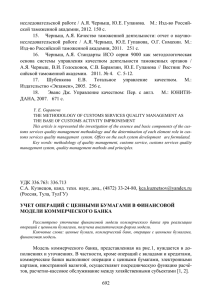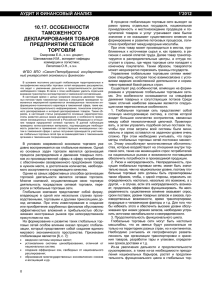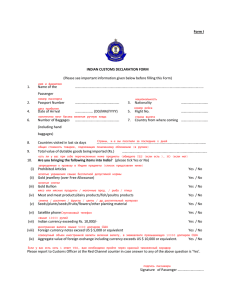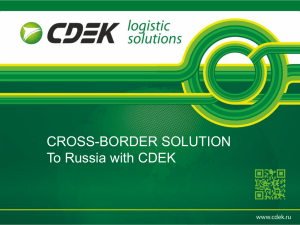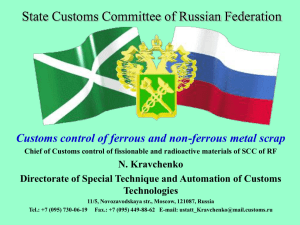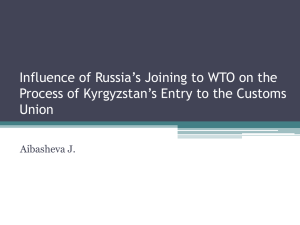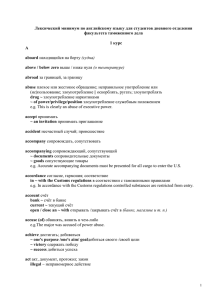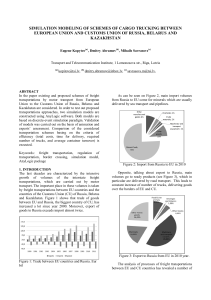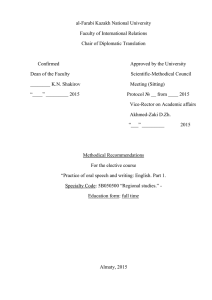Change Management - rocb
advertisement
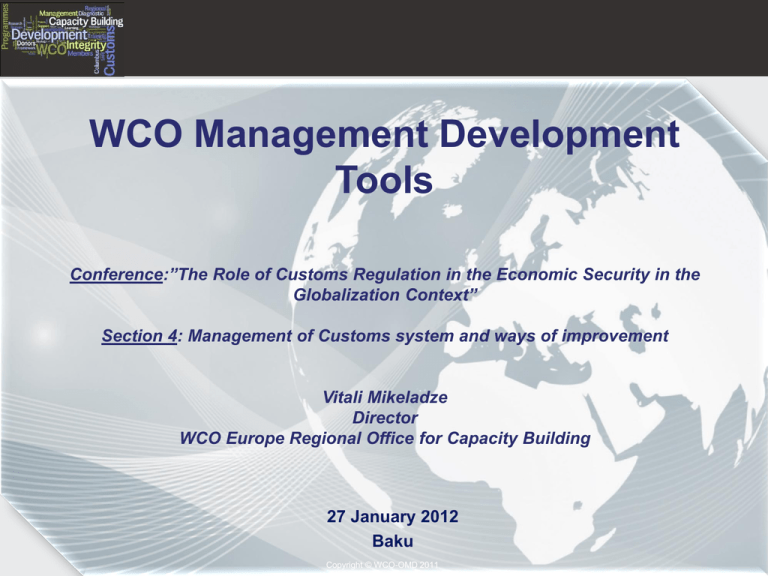
WCO Management Development Tools Conference:”The Role of Customs Regulation in the Economic Security in the Globalization Context” Section 4: Management of Customs system and ways of improvement Vitali Mikeladze Director WCO Europe Regional Office for Capacity Building 27 January 2012 Baku CopyrightWorld © WCO-OMD 2011 Organization Copyright © 2011– Customs Всемирная Таможенная Организация • 177 членов • Пересмотренная Киотская Конвенция по Упрощению и Гармонизации Т-процедур (вступила в силу 3/022006; 77 государств) • Стамбульская Конвенция • Найробийская Конвенция (Йоганесбургская Конвенция) • Пересмотренная Арушская Декларация • Гармонизированная Система (141 государство; 5000 товарных групп) Copyright © 2011– World Customs Organization Инструменты ИР ВТО • Стратегия институционального развития ВТО (2003) • Рамочные Стандарты Безопасности и Облегчения мировой торговли (2005г.; две основы (3-сотр-во с к/органами на границе?), 4 элемента, 17 стандартов) • Программа «Колумб» –26/01-2006: 166 стран-участниц, из них 120 – с помощью ВТО,115 ДМ, 83 ТС на стадии внедрения, (Европа:16 – с помощью ВТО, 15 ДМ) • Таможня 21го века (10 строительных блоков) • Модель данных ВТО (включающая ЕО) • Методика хронометража Времени • База данных по правилам происхождения товаров • Стратегия регионализации ИР(РУЦ, РИЛО, Рег/Офис) • Стратегия ИР Европейского региона Copyright © 2011– World Customs Organization Подготовка кадров ТС • Система Электронного обучения (CLiKC-Сustoms Learning and Knowledge Community): более 150 модулей, на 3-5 языках, 250 часов, 2500 страниц, интерактивная форма, облегченный доступ с помощью Интернета • Программа «ПИКАРД» (Партнерство в развитии таможенных академических исследований), 80 Университетов и вузов: а) разработка учебных программ (Профессиональные стандарты управления ВТО; учебные программы (бакалавр/магистр), лицензирование программ (7 вузов) б) научные исследования по актуальной тематике (СBM, Оценка результатов деятельности; ежегод. kонференции, журнал INCU) • Программа укрепления морально-этического состояния ТС (семинарские занятия, концепция внедрения) Copyright © 2011– World Customs Organization Подготовка кадров ТС Copyright © 2011– World Customs Organization Copyright © 2011– World Customs Organization WCO Capacity Building approach WCO Capacity Building Strategy (2003) – basis for sustainable CB development of Members “…helping WCO Members develop or acquire the skills, competencies, tools, processes, and resources needed to improve the capacity of the administration to carry out its allotted functions and achieve its objectives.” ◊ Customs CB Operational Strategy (2008) - Members’ engagement and ownership of modernisation programmes – key to sustainable development - mobilisation of regional and global resources and development of partnerships to deliver CB Copyright © 2011– World Customs Organization The WCO Capacity Building Portfolio The WCO CB programmes and initiatives • - Columbus Programme • - Learning, including CLiKC! • - Integrity • - Fellowship Programme • - Career Development Programme (previously Internship Programme) • - PICARD Programme • - Management Development Programme • - Regionalization • - Tripartite Agreements Copyright © 2011– World Customs Organization Leadership and Management Development Workshop Module 1 - Introduction Module 2 - Elements of a Modern Customs Administration Module 3 - Strategic management Module 4 - Self-evaluation Module 5 - Leadership Module 6 – Visioning Copyright © 2011– World Customs Organization Leadership and Management Development Workshop Module 7 - Management Styles and Situational Leadership Module 8 – People Management Module 9 - Promoting Integrity Module 10 – Negotiation Skills Module 11 – Communications Module 12 - Change Management Copyright © 2011– World Customs Organization Module 1 Presentation of the workshop & Introduction of participants Management development as WCO priority Capacity building and Customs modernization Skills necessary to be an effective strategic manager in a Customs environment Creation of an atmosphere conducive to learning Ground rules of the workshop Understanding the roles of facilitators and participants Time – 70 minutes Copyright © 2011– World Customs Organization Module 2 Elements of a Modern Customs Administration 7 dimensions of a modern Administration, based on the WCO Diagnostic Framework Analysis of the requirements of these elements to better understand Customs modernization Overview of key international standards and best practices in the area of Customs Overview of Customs in the 21st Century Time – 120 minutes Copyright © 2011– World Customs Organization Module 3 Strategic management Concept of Strategic management – its application in the administration Defining Leadership – What is it? Presentation on PICARD Introduction to the Personal Development Pyramid ‘Knowing yourself’ – an issue for leaders Increasing awareness for qualities Time – 240 minutes Copyright © 2011– World Customs Organization Personal Development Pyramid “Spirit” Mission Values Beliefs Qualities Behaviours Environment Copyright © 2011– World Customs Organization Module 4 Leadership and Management self-evaluation Self-assessment of own leadership and management skills Validate understanding of skills Identify strengths and weaknesses – develop a personal development action plan Individual exercise with coaching support from facilitators and co-participant “Being a partner” - applying some basic coaching principles Time – 30 minutes Throughout the duration of the workshop Copyright © 2011– World Customs Organization Module 5 Leadership Distinction between Leadership and management Focus on raising self-awareness Leadership in action – behaviours of leadership and its impact Story-telling Leadership and future – imagining an ideal World Awaken the leader through greater self-awareness - body, mind, emotions and spirit Servant leadership – “parent of the world” Time – 245 minutes Copyright © 2011– World Customs Organization Module 6 Visioning Understanding the administration’s vision statement and beyond Visioning at the organizational level and at the “work area” level Difference between mission, vision, strategy, and organizational values Visioning as an ongoing process “Walk the walk and talk the talk” Time – 175 minutes Copyright © 2011– World Customs Organization Module 7 Management Styles and Situational Leadership Understanding your own management style and that of the administration Identifying your preferred style Understanding and experiencing various management styles Situational Leadership – its four dimensions Leader: Work and Person Worker: Task Maturity, Commitment and beyond Time – 175 minutes Copyright © 2011– World Customs Organization Module 8 People Management HR Management vs People Management Achieving results through others Motivation Delegation Coaching & Feedback Performance management Time – 360 minutes Copyright © 2011– World Customs Organization Module 9 Promoting Integrity Integrity and corruption in the Customs environment Broad concept of integrity: anti-corruption, professional conduct Impact on objectives, organisation, people, stakeholders, Organisational response: integrity development in the Customs context – based on the Revised Arusha Declaration Anti-corruption pipeline Role of the manager in the promotion of integrity in the workplace - concrete actions that should be taken Personal values and integrity Time – 220 minutes Copyright © 2011– World Customs Organization Module 10 Negotiation Skills Negotiations in the Customs context – role play Manager as a negotiator on a daily basis Best practices and lessons learned Time – 120 minutes Copyright © 2011– World Customs Organization Module 11 Strategic Communication Skills Managing strategic communications – achieving results through effective communications What is it? and how to apply strategic communications Strategic communications in practice – identifying good examples Segmentation and stakeholder analysis Time – 150 minutes Copyright © 2011– World Customs Organization Module 11 Personal Communication Why is personal communication important for a manager How can one improve his/her communication skills What can have an impact on communication: - Body language - Filters Emotional intelligence Time – 180 minutes Copyright © 2011– World Customs Organization Module 12 Change Management Change management principles and concepts Consolidate many other skills acquired and issues covered Types of changes and drivers for change Role of manager in managing change Change and personal transition process How can the manager lead people to accept change Time – 120 minutes Copyright © 2011– World Customs Organization Module 12 Change Management Organizational change management Familiarize with Kotter’s 8-step approach to change management Apply concepts to practical Customs cases Time – 185 minutes Copyright © 2011– World Customs Organization Other LMD modules 9-day core programme 1-day for optional modules Possible modules: - Business case preparation Project proposal preparation IT governance Corporate risk management Performance measurement Diversity in the workplace Time management Conflict resolution Others? Copyright © 2011– World Customs Organization LMD for Top Executives 3-day high level and interactive facilitated discussion on senior leadership and Customs management issues Targeted participants: Top managers only Based on Building Block A and PICARD standards Upon request from Members only Contents? Facilitators? Other issues? Copyright © 2011– World Customs Organization Regionalisation in Europe WCO Regional Office for Capacity Building in Baku(ROCB): • Coordinate CB activities in Europe region • Identify Members CB needs • Provide support to Members compliant to WCO instruments (RKC) • Promote modern HR development programmes (PICARD) • Ensure availability of professional training resources • Promote development of change management skills • Coordinate activities of RTCs • To develop staff to be able to support Members reforms etc. Regional Web-portal: Compendium of National Training Centers (Europe) + Customs academic Universities Scientific Journal- your articles are welcome Copyright © 2011– World Customs Organization WCO Europe’s ROCB IN Baku IS OPEN FOR COOPERATION WITH ACADEMIA: Natiq Aliyev str., 4a 1025 – Baku, Republic of Azerbaijan Tel:+994 12 464 3134/35 Fax:+994 12 464 3136 E-mail:vitali.mikeladze@customs.gov.az THANK YOU Copyright © 2011– World Customs Organization
